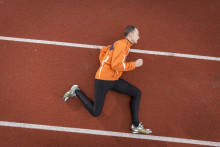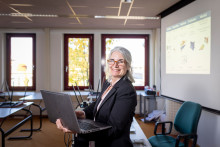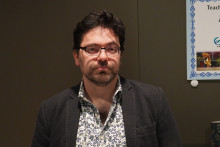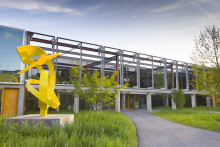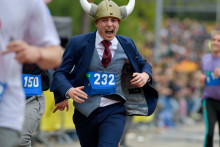When Wan Bakx was in his teens, he had a Saturday morning paper round. He must have been a surprising sight to his customers: 'I needed to finish the paper round before hurdles training. Sometimes I would do my warm-up during the round by not opening the garden gates but just hurdling over them.'
Bakx, lecturer and course coordinator of the Geo-informatics track within the ITC master's programme of Geo-Information Science and Earth Observation, has been involved with athletics for 45 years. As a junior he showed 'a bit of talent', but did not have the right opportunities. It wasn't until he was seventeen years old that his hurdling talent was discovered, when he became a member of a larger athletics club, the Prins Hendrik Club in Vught, the Netherlands. At his previous club there hadn’t even been a man-made track, let alone hurdles.
So when he changed clubs he discovered one of the great athletics disciplines. 'Anyone can sprint from one point to the next. But for hurdling you need a lot more coordination. You get to know your body and learn to control it. To understand how difficult this is, all you need to do is watch a beginner. Anyone can jump over an obstacle, but for hurdles you need to have absolute coordination of take-off, stride length and speed.'
International athlete
'I'm not sure I made the most of it,' Bakx comments, looking back on the first part of his sports career. 'I was busy with my degree and quite soon, through athletics, I met the woman who would later become my wife.' He took part in national championships but didn't progress beyond 'super regional, but sub national' level. 'The National Championships were fun, but I never progressed any further.'
Bakx' 'breakthrough' happened when he was 40, when he started to take part in 'masters' championships. He was still training twice or three times per week and felt it was 'going quite well'. What an understatement! Bakx has won the Dutch title in the age categories of 40+, 45+ and 50+ several times in the past few years, at hurdles, long jump and pentathlon. He holds ten national records, including 50 and 60 metres hurdles (indoor) in the 40+, 45+ and 50+ categories. 'It may sound strange, but a national title doesn't really count for me. I don't really have any competitors in the Netherlands.'
So he has moved up to international competition. In 2009 and 2016, he became European indoor pentathlon champion and last year he was fifth in the world in the outdoor hundred metres hurdles and the long jump. He has also won two silver medals at last year's European Championships behind the world champion and world record holder. And he has taken part in the World Master Games, the Olympic Games for veterans of 35+. 'Fantastic! This is the largest sports event in the world, with 27,000 participants. You can see 80-year-olds diving into the pool with a super elegant somersault. Really inspiring!'
Remote sensing
Bakx discovered ITC during his degree in Geography at Utrecht University. He went to Enschede for a course in digital image processing. 'There were lots of international students on the course. I really enjoyed both the course content and the working environment.' Soon after obtaining his degree in 1987 he was taken on as a data analyst and then gradually moved into education. He has now been teaching for more than 25 years. In the past ten years, he has been coordinating the master’s programme and the short courses that are part of the Geo-informatics specialization track.

'As I've never concentrated on my research skills, I tend to teach the basic courses in remote sensing. I teach the students how remote sensing images (from satellites) are constructed. You need to know how these kinds of images are recorded before you know how to make sense of them properly.' Bakx uses examples close to home, such as a satellite image of the Dutch region of Noordoostpolder, as well as aerial photos of the home countries of his students, such as Lake Naivasha in Kenya.
'Editing contrast and brightness is something anyone can do using Photoshop, but not many people really know what they are doing,' he explains. 'In many spectral bands (the wavelength of light) it matters to what extent the light is reflected by water or land. So the way you edit the histogram of an image depends on whether you're interested in water quality or land use. That kind of basic knowledge is essential in using remote sensing appropriately. ’
Commitment to education
Although Bakx' time is increasingly taken up by coordinating, he makes sure he keeps teaching as well. 'I want to stay in touch with teaching. I enjoy teaching ITC because our students are highly motivated. That keeps us on our toes. ITC students come here to gain the knowledge to help their organizations progress. What better motivation could there be? And they have another great incentive. Studying is a great investment, not just in money, but in time, because they are away from home for eighteen months.'
Bakx himself spent some time working abroad. At the start of the 90s, shortly after the Gulf War, he took two years' unpaid leave to train the Saudi Arabian topographical service. 'That was a unique experience, as Saudi Arabia is not that easy to get into. Of course you know that their culture is very different from ours, but we were actually able to experience it for ourselves. You see the way in which the king of Saudi Arabia tries to balance the wishes of westerners with influential religious groupings. You can tell the difference between the capital Ryad, which is meant to be a model for traditional Saudi Arabian values, and Jeddah, on the Red Sea, which is much more westernised.'
Bakx has also been to Nigeria and Tanzania in connection with his ITC work. He says it is important to see where his students come from. 'It's good to see their native education and work environment. And you can see how the things you are teaching them are going to be used. That ITC mission is part of me, too. We contribute our bit to helping developing countries grow, one small step at a time, because you can't just change a whole country at once, of course. I enjoy that.'
Run4Fun
Bakx has another quest within ITC. In 1999 he started up Run4Fun, an initiative which combines his work and his hobby. Run4Fun is a running group consisting mainly of ITC students and some members of staff, which trains every Wednesday afternoon led by Bakx and his colleague Simon Engelberts. 'Our aim is to enjoy some physical exercise together. Run4Fun gives the students a break from their books. Some of them feel they have to study 24 hours a day. That's impossible and unnecessary.'

Their annual highlight is the Batavieren Race, a running event that the students will experience just once, as they usually return to their home countries after their eighteen months master's programme. At the end of April, Bakx will enter Run4Fun as the most international team in the race for the seventeenth time running (the ITC team took part six times before, yet under a different name). 'We’ve had years when we had about twenty different nationalities.'
People think the ITC team will be really fast, because Bakx has students from countries with a strong running tradition, such as Kenya and Ethiopia, but that is a misconception he is able to dispel very quickly. 'When ITC as a faculty became part of Twente University, the university team was quick to send us their request. You've got loads of Kenyans, why don't you just send them all over to us. So I had to reply: we have the brainy Kenyans and Ethiopians, not the athletic ones. If you're from those countries and are good at running, then you focus on your running, not on studying in the Netherlands.'
The aim for Run4Fun is not to end up heading the leader board. Taking part is more important than winning. But if you are going to take part, we insist that you train. 'Our aim is that our students finish their lap with a smile on their face. That means they've got to train, or there won't be any smiling.'
Bakx himself won't be taking part in the next race. He will stick to his ten Batavierenrace appearances for the time being. Taking part is too risky for him. 'I know I'd have to stop training on the track for a while, as I would damage some muscles. That's something you begin to notice as you get a bit older: I am less explosive and more vulnerable to injuries, especially in my calves and Achilles tendons.Yes, it's a bit frustrating, but my track training is more important. And anyway, Run4Fun is really about the students. It's their chance to experience the 'Bata'.'


